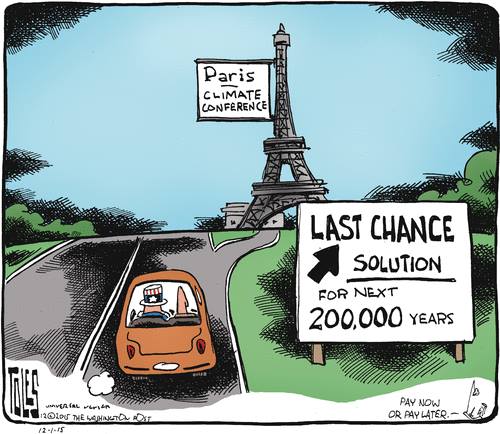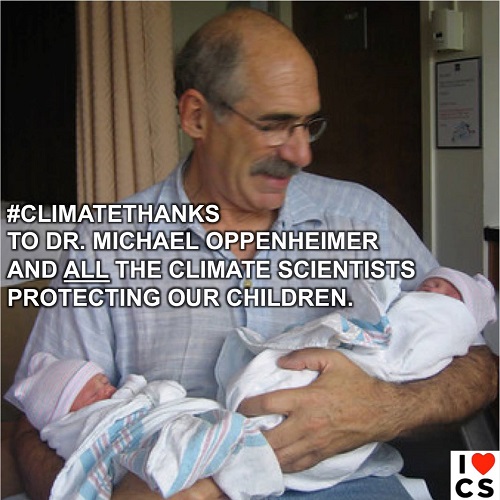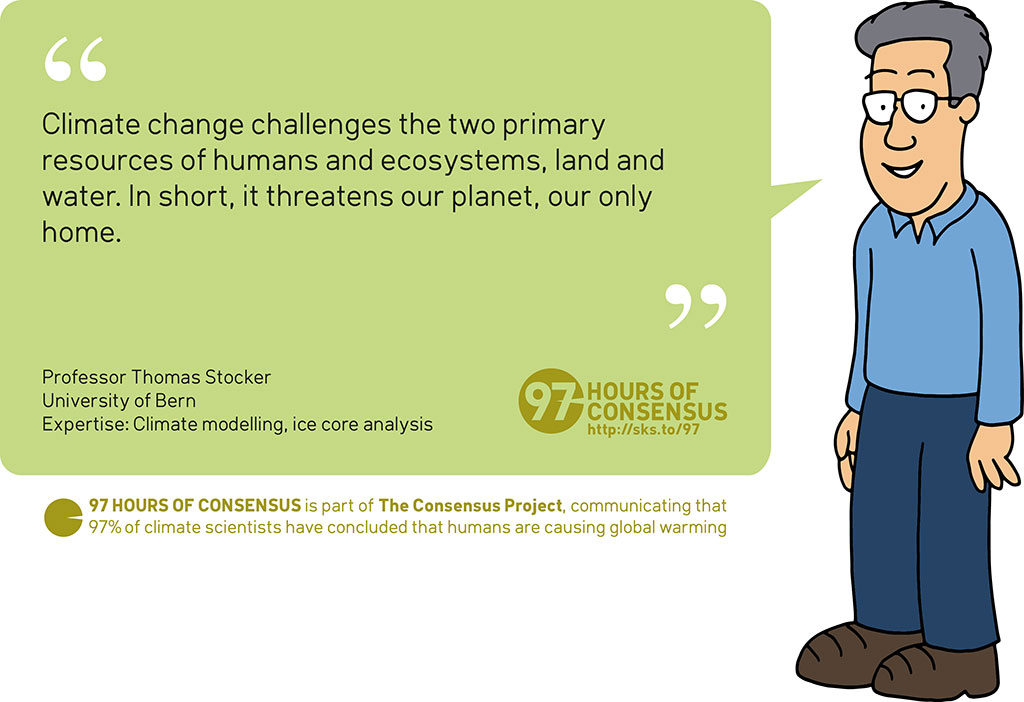2015 SkS Weekly Digest #49
Posted on 6 December 2015 by John Hartz
SkS Highlights... Toon of the Week... Quote of the Week... New Rebuttal Article Added... Coming Soon on SkS... SkS in the News... Poster of the Week... SkS Week in Review... 97 Hours of Consensus...
SkS Highlights
How much does animal agriculture and eating meat contribute to global warming? by Dana generated the most comments of the articles posted on SkS during the past week. Scientists' open letter to the Wall Street Journal re: Ridley and Peiser , reposted from the Climate Feedback website garnered the second highest number comments.
Toon of the Week

Hat tip to I Heart Climate Scientists
Quotes of the week
Marcia McNutt, a former U.S. Geological Survey director and Science magazine editor who is about to become the head of the U.S. National Academy of Sciences, can't say enough about the importance of the pope's message.
"You can argue the science until cows come home, but that just appeals to people's intellect," McNutt said. "The pope's argument appeals to someone's heart. Whenever you appeal to someone's heart that's a much more powerful message."
Scientists enlist the big gun to get climate action: Faith by Seth Borenstein, AP (Associated Press), Dec 5, 2015
Laurence Tubiana, the French envoy for the talks, said: “We could have been better, we could have been worse. The job is not done, we need to apply all intelligence, energy, willingness to compromise and all efforts to come to agreement. Nothing is decided until everything is decided.”
Paris climate change talks yield first draft amid air of optimism by Lenore Taylor & Suzanne Goldenberg, The Guardian, Dec 5. 2015
SkS in the News
In his Slate article, Researchers: Exxon, Koch Family Have Powered the Climate-Denial Machine for Decades, Eric Holthaus states:
John Cook, whose website skepticalscience.com has become a de-facto clearinghouse for exposing climate denial memes, called Farrell’s research a “crucial piece of the puzzle.”
New Rebuttal Article Added
Dana's How much does animal agriculture and eating meat contribute to global warming? is the new rebuttal to the myth 'animal agriculture and eating meat are the biggest causes of global warming.' It's available at the short URL sks.to/meat
Coming Soon on SkS
- Analysis: the key announcements from Day 1 at COP21 (Carbon Brief)
- Betting against global warming is a great way to lose money (Dana)
- The Road to Two Degrees, Part Three: Equity, Inertia and Fairly Sharing the Remaining Carbon Budget (Andy Skuce)
- Guest Post (John Abraham)
- How Exxon Overstates the Uncertainty in Climate Science (John H. Cushman Jr.)
- 2015 SkS Weekly News Roundup #50 (John Hartz)
- 2015 SkS Weekly Digest #50 (John Hartz)
Poster of the Week

SkS Week in Review
- 2015 SkS Weekly News Roundup #49 by John Hartz
- Scientists' open letter to the Wall Street Journal re: Ridley and Peiser (Climate Feedback)
- New research finds that global warming is intensifying wildfires by John Abraham (Climate Consensus - the 97%, The Guardian)
- Deep Ocean: Climate change’s fingerprint on this forgotten realm by Roz Pidcock (Carbon Brief)
- Uncertainty is Exxon's friend, but it's not ours by Stephan Lewandowsky (Climate Consensus - the 97%, The Guardian)
- How much does animal agriculture and eating meat contribute to global warming? by Dana
- 2015 SkS Weekly Digest #48 by John Hartz
97 Hours of Consensus: Thomas Stocker

Quote derived with author's permission from:
"[Climate change] challenges the two primary resources of humans and ecosystems, land and water. In short, it threatens our planet, our only home."































 Arguments
Arguments






























I normally enjoy the cartoon in the weekly digest, but to be funny they need to have a resemblence to reality. In this case, any delay in finding a solution increases the cost of that solution, either in more rapid required emissions and hence a higher carbon price or regulatory cost to drive that rapid reduction, or in the cost of an extensive sequestration process, or through higher, more damaging impacts. But nevertheless there will be many opportunities for alternative solutions to AGW in the future - particularly as regards to very long term impacts.
To further emphasize Tom's point, COP21 will not, does not even intent to solve climate change problem. A modest or medium emision reductions they are going to agree on, is just a start albeit very important one. We know the comprehensive solution, in the implied 200ky timeframe, or even shorter 100y timeframe, is zero or even negative emissions. Future COPs will have plenty of opportunities for more effective solutions.
At the moment, it looks like a long term process, regardeless of COP21 outcome: future generations will have to deal with total emission control. On a long/implied timescale, any sustained positive emissions even 5-10% of current level may still be too fast to stabilise the climate. The level of natural emissions of "old" geospheric carbon by volcanoes is just 1% of current antropo.
Mechanisms to capture industrial emissions have to be made of irreplaceable materials and have limited lifetimes. They may reduce the rate of emissions slightly for a while. As there is an existing commitment for infrastructure to use fossil fuels at a high rate, the concentration level in the atmosphere and ocean will continue to rise even if remedial policies are implemented.
The sign of whether or not politicians are taking their COP21 commitments seriously will be whether or not they pick the low hanging fruit; the easily legislated measures which will begin to make a difference. For instance they could tip the playing field in favour of electric cars. This is a particularly gentle measure since Electric cars are not yet quite there for a large porportion of the driving public. Taking these measures now will signal the players in the market of what is coming and be much easier than doing it when the third generation Tesla is in full production. Doing it now allows car dealers, mechanics, oil companies and so forth to prepare. A second easy measure would be to impliment Hansen's Tax and Dividend. No need for a large tax but only a legislated tax increasing year by year by a predetermined amount. This would also be a very gentle measure also in terms of it's speed of disruption. Cap and trade measures have conclusively been shown not to work, to be easil scammed and to only make the banks and traders richer instead of the people.
http://mtkass.blogspot.co.nz/2009/11/legislation-for-electric-cars.html